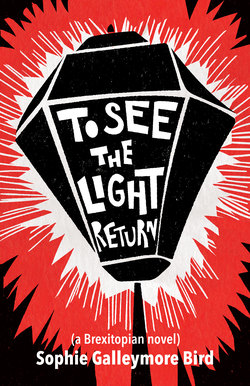Читать книгу To See The Light Return - Sophie Galleymore Bird - Страница 2
На сайте Литреса книга снята с продажи.
prologue
ОглавлениеI blame the Queen. If she hadn’t died, if she’d clung on and outlived her son, or bypassed him in the succession and passed the crown to the more tractable William, Charles wouldn’t have been crowned King. He wouldn’t have confirmed himself as an autocratic and eccentric despot in the minds of the British public, and the old-school farmers of Devon wouldn’t have rebelled against him using his status – as both monarch and landowner – to push Parliament towards converting all agriculture to organic standards. He might as well have been trying to enforce Satanic Masses for the uproar it caused among a farming community still reeling from the trauma and divisions of Brexit.
I also blame UKIP, declaring they spoke for all despite imploding as a national political party once the odious Farago departed. If they hadn’t stoked up trouble from their HQ in Torbay, whispering rebellion in the ears of our County and District Councillors – a lot of them farmers struggling to adapt to climate change and a public persuaded away from the mainstays of Devon agriculture, meat and dairy – it could all have blown over and reached a compromise that would have benefitted everyone. But no, both sides in the argument dug in and became increasingly entrenched and bitter.
What sounded like a joke, co-opting local passport and ‘Republic of Devon’ campaigns begun by Remainers, became an actual thing – Devolution for Devon, Take Back Our Land, Make Devon Great Again – with a referendum bought and paid for by UKIP and modelled on the secession of Cataluña from Spain. Cornwall and Scotland had been talking the talk for decades but stood back and watched as we went and took the plunge.
Despite the confident rhetoric of the campaign claims, and the warnings of recent history, it turned out the Devolvers had no plan for how to structure our governanace once we had seceded. We continued to be run by elected Councils, so one could argue we are effectively a Republic, but scratch any one of the Councillors, or our successive Mayors, and I think you’d find a Royalist not far beneath the surface. That is our abiding problem – there was no real shifting of power to the people. I wouldn’t be surprised if our latest incumbent saw himself as a defacto King rather than a civic dignitary. He certainly likes to wear his chains of office at every opportunity; if a crown and sceptre were to be proposed, I do not think he would refuse them.
It was hard to see the difference at first, once Devolution was ‘won’. The real changes came after Westminster pulled the army and navy bases out, and we lost the jobs and supply chains they sustained. Militia were called up from the local populace – and I mean local, because thousands of the people who had flocked here to live in our ugly new housing developments left before the ink was dry on Devon’s Declaration of Independence and Secession – but there was no money to pay them. The unemployed were drafted – and there were many of those, myself included, because there were very few jobs left with fewer retirees to service. Any that stayed were too skint to leave and therefore too skint to pay for lattes, colonics and home care. There was a mass die-off within the first three years because public services fell apart.
Militia – armed with weapons traded illegally by the more enterprising of the departing army personnel – began patrolling our borders, looking for people entering or leaving without paying the tolls. Identifiable by their black uniforms, with a patch on the chest denoting the Devon flag (a black-bordered white cross on a green field the colour of mould), tales of abuses of power, both within their ranks and towards the populace, were rife but whispered.
I managed to escape the draft, being a lesbian and thus undesirable in public service; sexual freedoms were one of the first things to go. My wife and I had to stop expressing affection in public, had to pretend just to be housemates and hide our wedding bands.
Roads were blocked and began to deteriorate without central funding. Train services were axed, because we couldn’t afford to maintain the tracks, or come to an agreement with the national network. Electricity supplies became erratic, because the National Grid wasn’t allowed to maintain our part of the network without paying outrageous fees for the privilege. Solar panels were raided from solar farms and abandoned homes, by organised gangs from Somerset, or stolen from houses as their occupants slept. Everything broke, and stayed broken, because most of the expertise had left and there were no spare parts.
Our water and sewage systems broke down, abandoned by private companies with an eye on their bottom line rather than ours.
After that life became – literally – shit.
From the memoirs of Mrs Prendaghast
